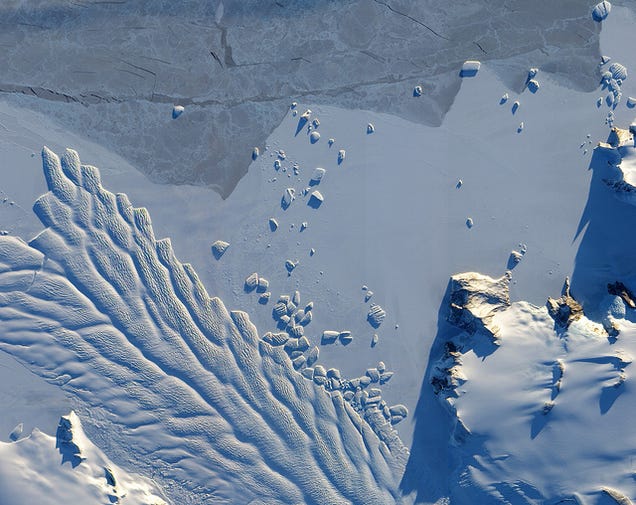
The Central Intelligence Agency has announced that it’s closing down MADEA, a decades-old research program that shared classified information with scientists to study how climate change might exacerbate global security risks.
Top image: Spy satellite data has revealed Antarctic ice vulnerability. (Credit: NASA/Goddard)
MEDEA, or Measurement of Earth Data for Environmental Analysis, was a CIA initiative that ran from 1992-2001, and then again during the Obama Administration. The program allowed civilian scientists to access classified data, including topography data captured by spy satellites, and ocean temperature and tidal readings collected by Navy submarines. This was a mutually beneficial arrangement; civilian scientists had access to data they wouldn’t normally have access to, while the CIA learned about security risks that might be spawned by climate change.
But as Tim McDonnell of Mother Jones reports, the program has come to a close.
In a statement, a CIA spokesperson explained: “Under the Medea program to examine the implications of climate change, CIA participated in various projects. These projects have been completed and CIA will employ these research results and engage external experts as it continues to evaluate the national security implications of climate change.”
Some experts are concerned about the program closure — especially now. As McDonnell writes:
Marc Levy, a Columbia University political scientist, said he was surprised to learn that Medea had been shut down. “The climate problems are getting worse in a way that our data systems are not equipped to handle,” said Levy, who was not a participant in the CIA program but has worked closely with the US intelligence community on climate issues since the 1990s. “There’s a growing gap between what we can currently get our hands on, and what we need to respond better. So that’s inconsistent with the idea that Medea has run out of useful things to do.”
The program had some notable successes. During the Clinton administration, Levy said, it gave researchers access to classified data on sea ice measurements taken by submarines, an invaluable resource for scientists studying climate change at the poles. And last fall, NASA released a trove of high-resolution satellite elevation maps that can be used to project the impacts of flooding. But Levy said the Defense Department possesses even higher-quality satellite maps that have not been released.
Others argue that MEDEA has outlived its life, and that the over-taxed intelligence agency needs to direct its attention elsewhere.
At the same time, however, climate change has been referred to as a “threat multiplier.” It’s unlikely, therefore, that the CIA is totally giving up on climate change; the agency may find ways to facilitate civilian research. “Otherwise,” as Francesco Femia, co-director of the Center for Climate and Security, told McDonnell, “we will have a blind spot that prevents us from adequately protecting the United States.”
Read the entire article at Mother Jones.


